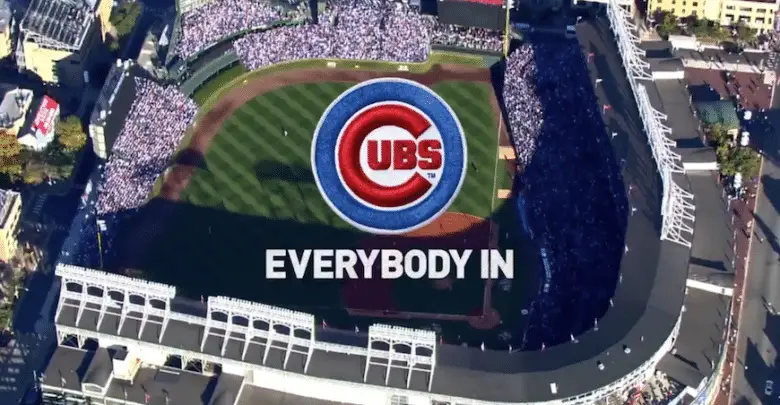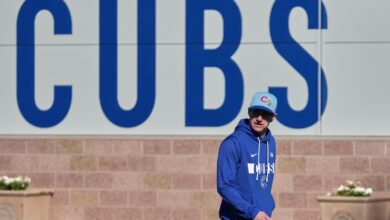
Sinclair Earnings Call Offers Peek into Marquee Network’s Revenue Projections
Alright, who’s ready to play a round of “Guess How Much Money the Cubs Will Make from Marquee Network?” It’s a guessing game that involves backing into math and making assumptions based on sketchy information, but it can be fun if you’re a huge nerd. Lucky for you, I am indeed a nerd of epic proportions.
Not much is known about the Cubs’ new Marquee Network, a joint venture with Sinclair Broadcast Group that will launch in February 2020, beyond the the gross details. It’ll be a 24-hour channel with the Cubs as the clear anchor product, broadcasting live games, replays, pre- and post-game coverage, and other original programming. Additional teams may be featured at some point (they’d be so smart to license broadcasts of foreign leagues), but we’re talking lower-tier outfits that would be riding the Cubs’ coattails.
What little we know about the actual revenue the Cubs will be generating from the new venture comes from estimates and common sense. Eric Fisher of the Sports Business Journal wrote just after the deal’s announcement that the team was expected to see “a substantial bump in its annual rights fees from the less than $70M the franchise is estimated to receive annually from local cable and broadcast TV.” In addition, the Cubs currently receive equity distributions from partial ownership of NBC Sports Chicago that add to the total.
But what exactly does “substantial” mean? Just taking into account all the time, effort, and capital that goes into starting a new network, you’d think an additional $10 million annually would be the very minimum just to break even after a few years. So let’s just go with that for now, and assume another $10 million in the additional equity from NBCSC. Again, these are just fuzzy estimates that are serving as placeholders for the time being.
Fisher offered an additional glimpse into the overall revenue picture when he tweeted a nugget from Sinclair’s recent earnings call with Wall Street types. Sinclair CEO Christopher Ripley claimed that the new network is projected to generate “about $40-50 million of free cash flow” annually, which is significantly less that what we saw above for the Cubs.
Sinclair CEO Christopher Ripley says in earnings call the Cubs’ new Marquee Sports Network is projected to generate for the company “about $40 million to $50 million of free cash flow [per yr] and it is a model for other partnerships going forward.”
— Eric Fisher (@AEricFisher) February 27, 2019
All of this is simply estimated revenue figures to excite investors and perhaps even fans, but it does offer us an idea of where expectations stand. Tom Ricketts told Cubs Insider and other blogs during a summit in Mesa earlier this month that the Cubs will receive a rights fee up front and will then split profits with Sinclair. If there are profits, that is, which there’d darn well better be.
That all depends on what kind of carriage fee the network will charge and how well Sinclair can sell Marquee to providers throughout the Cubs’ MLB-dictated broadcast territory. There will also be significant startup costs, presumably split between the two partners, that will eat into early profits. Both Ricketts and Theo Epstein have said that cash flow growth may be negligible at first, but should eventually exceed the current deal by a wide margin.
Sinclair’s forecast of $40-50 million represents their split of the profit, which would mirror what the Cubs get. It’s probably reasonable to assume that rights fee the Cubs will get is around $50 million, give or take $10 million, which would see them coming in at a total take of $80-100 million annually. And if we circle back to that whole “substantial bump,” those rights fees are probably closer to $60 million. This is all very conservative, no pun intended, and should be much higher over time.
How much the baseball operations budget will increase also remains to be seen, since we know neither how much extra revenue the Cubs will realize nor what portion of that will be allocated to payroll. Ricketts has said that it will take time for any impact to be felt, so take that for what it’s worth.
I have no idea how much capital the Cubs need to contribute to start this whole thing up, but carving those costs out of that $100 million figure would probably leave them right around what they’re going to make this year. So the big question I keep coming back to is this: Why would they be willing to settle for just breaking even early and then generating slow, steady growth from there? I guess the growth rate is fine no matter what since it’s capped by both price elasticity and MLB’s silly territorial restrictions.
But when you open a new business, even if it’s part of a well-known franchise, it’s typically a good idea to have some sort of grand opening. Maybe you do a little extra advertising, some giveaways, anything to entice customers to walk through the door and get them coming back. A TV network is no different, particularly when you’re talking about one that represents a significant departure from past relationships with WGN and other stations that could be picked up over the air by Chicagoans.
Or perhaps it’s just crazy talk to insinuate that a marquee player — not to be confused with a Marquis player, like Jason — would be a boon to the eponymous network. Some might worry that a big free agent signing this season could fall prey to new-toy fatigue by the time the network is ready to go on the air, but that doesn’t matter. Sinclair is trying to sell Marquee to providers right now, so a splashy move would end up on the first slide of their sales presentation.
Now, there’s a distinct possibility that my assumptions and calculations here are so wildly inaccurate that both smart people reading this (I’ll leave it to you to guess which of the five total readers that describes) are burning their abacuses in effigy right now. But I think that, give or take a few million, I’m close enough to be like the folks living in the suburbs. Which is to say I can tell outsiders that I’m from the big city and they won’t know any better, even though people who are actually from the city are scoffing at me.
Numbers aside, I do understand marketing and I’ve got a general grasp of what the Cubs and Sinclair need to do to really juice the H-E-double-hockey-sticks out of this deal. And that’s selling it to anyone and everyone they can, which means having the best possible product to pitch both right now and into the future. Maybe the Cubs have exactly that with now tweaks required as we speak. I guess we’ll see.

